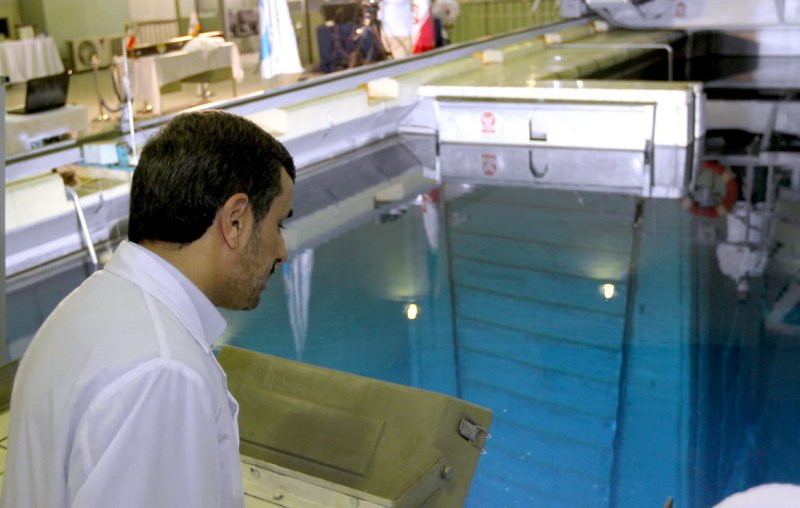A handout picture released by the Iranian President Mahmoud Ahmadinejad’s official website shows Ahmadinejad visiting Tehran’s nuclear reactor during the unveiling ceremony on February 15, 2012 in Tehran, Iran. Iran simultaneously unveiled three new nuclear projects on Wednesday. UPI |
License Photo
BRUSSELS, Feb. 29 (UPI) -- Washington and five other powers expect to announce new nuclear talks with Iran within days, diplomats said as Iran condemned nuclear weapons as "a great sin."
The United States, Britain, France, Germany, Russia and China have agreed in principle to accept Iran's Feb. 14 offer to resume talks that have been stalled for more than a year, the diplomats told the British newspaper The Guardian.
While the six powers had no high expectations of a breakthrough, they agreed every peaceful avenue should be explored in the hope of avoiding a new Middle East conflict, the newspaper said.
The West alleges Iran is building a nuclear-weapons capability but Tehran insists its nuclear program is for peaceful civilian uses only.
It has defiantly pursued uranium enrichment, despite international pressure and sanctions.
Tehran Tuesday called for negotiations on a treaty banning nuclear weapons and condemned their production or possession as a transgression of divine law.
Foreign Minister Ali Akbar Salehi told the international Conference on Disarmament in Geneva, Switzerland, Iran was "confident of the peaceful nature of its nuclear program" and said his country "has always insisted" on peaceful engagement over dangerous confrontation.
"We do not see any glory, pride or power in the nuclear weapons -- quite the opposite," he said, adding Iran would be a stronger country without nuclear arms.
"The production, possession, use or threat of use of nuclear weapons is illegitimate, futile, harmful, dangerous and prohibited as a great sin," he said, citing a religious decree by Iranian Supreme Leader Ayatollah Ali Khamenei.
The existence of nearly 23,000 nuclear weapons in the world poses "the gravest threat" to sustainable international security, Salehi said.
Laura E. Kennedy, U.S. ambassador to the conference, responded saying Iran's professed commitment to nuclear disarmament stood "in sharp contrast" to its failure to comply with international obligations.
She said Iran continued its uranium enrichment without transparency that would let the world know the nuclear program's peaceful nature.
"This is hardly illustrative of a commitment to nuclear disarmament," she said.
Salehi told reporters later Iran offered to hold additional talks on a "new mechanism through which we can settle outstanding issues."
The Guardian said the new talks could be announced this week, with European Union foreign affairs and security policy chief Catherine Ashton, the six powers' coordinator, probably offering to meet in Turkey in March.
The talks' previous round, also in Turkey, broke down more than a year ago after Iran presented conditions, including the lifting of sanctions, the West considered unacceptable.
The talks would take place against a backdrop of growing U.S. and E.U. economic sanctions against Iran and an Iranian vow to block the Strait of Hormuz in retaliation, preventing some 20 percent of the world's oil from being shipped.
U.S. Joint Chiefs of Staff Chairman Martin Dempsey said Washington would "take action and reopen the strait," which the general said could be accomplished only by military means.















